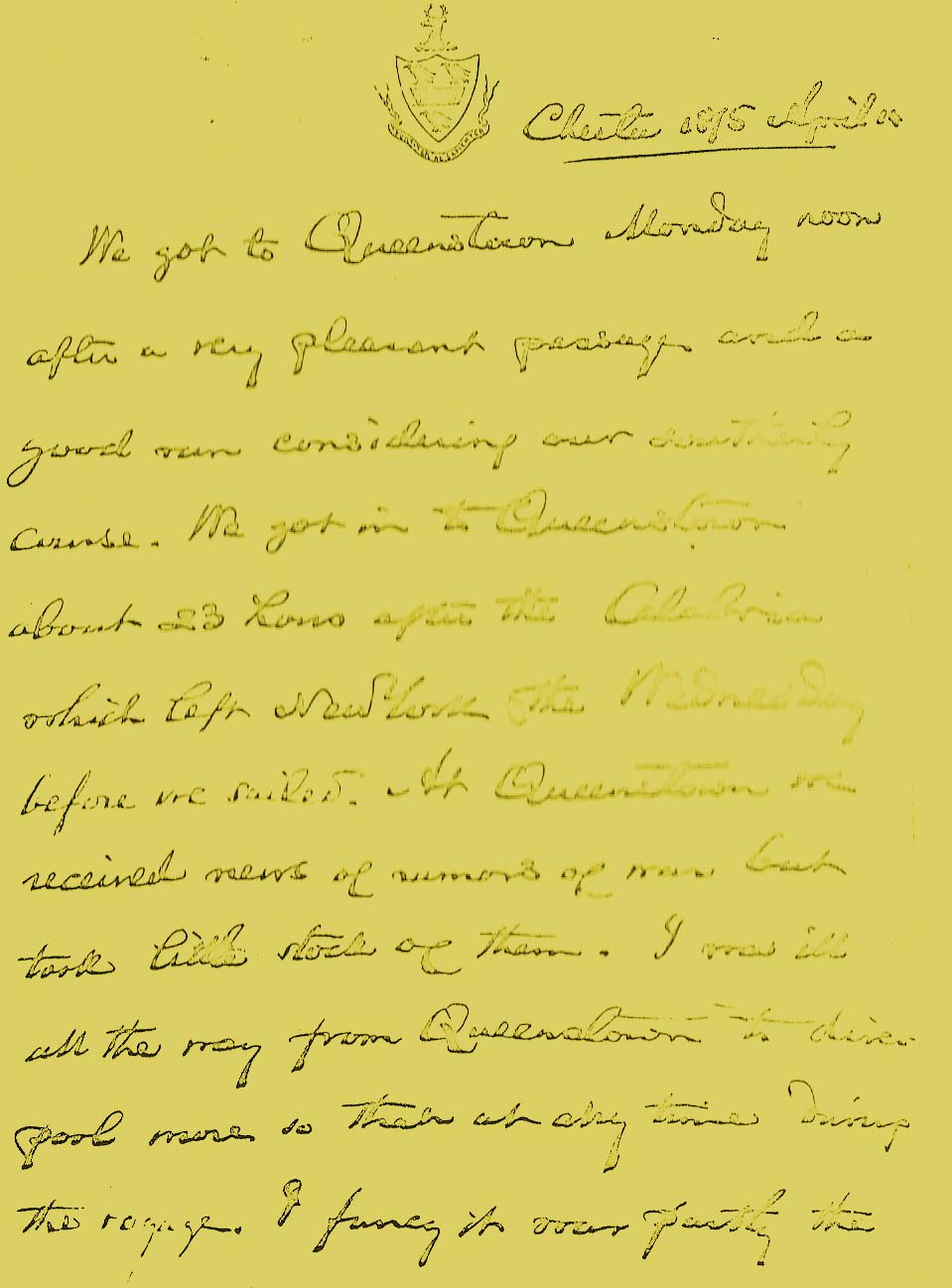
|
Chester 1875 April 14 We got to Queenstown Monday noon after a very pleasant passage and a good run considering our southerly course. We got in to Queenstown about 23 hours after the Calabria which left New York the Wednesday before we sailed. At Queenstown we received news of rumors of war but took little stock of them. I was ill all the way from Queenstown to Liverpool more so than at any time during the voyage. I fancy it was partly the
|
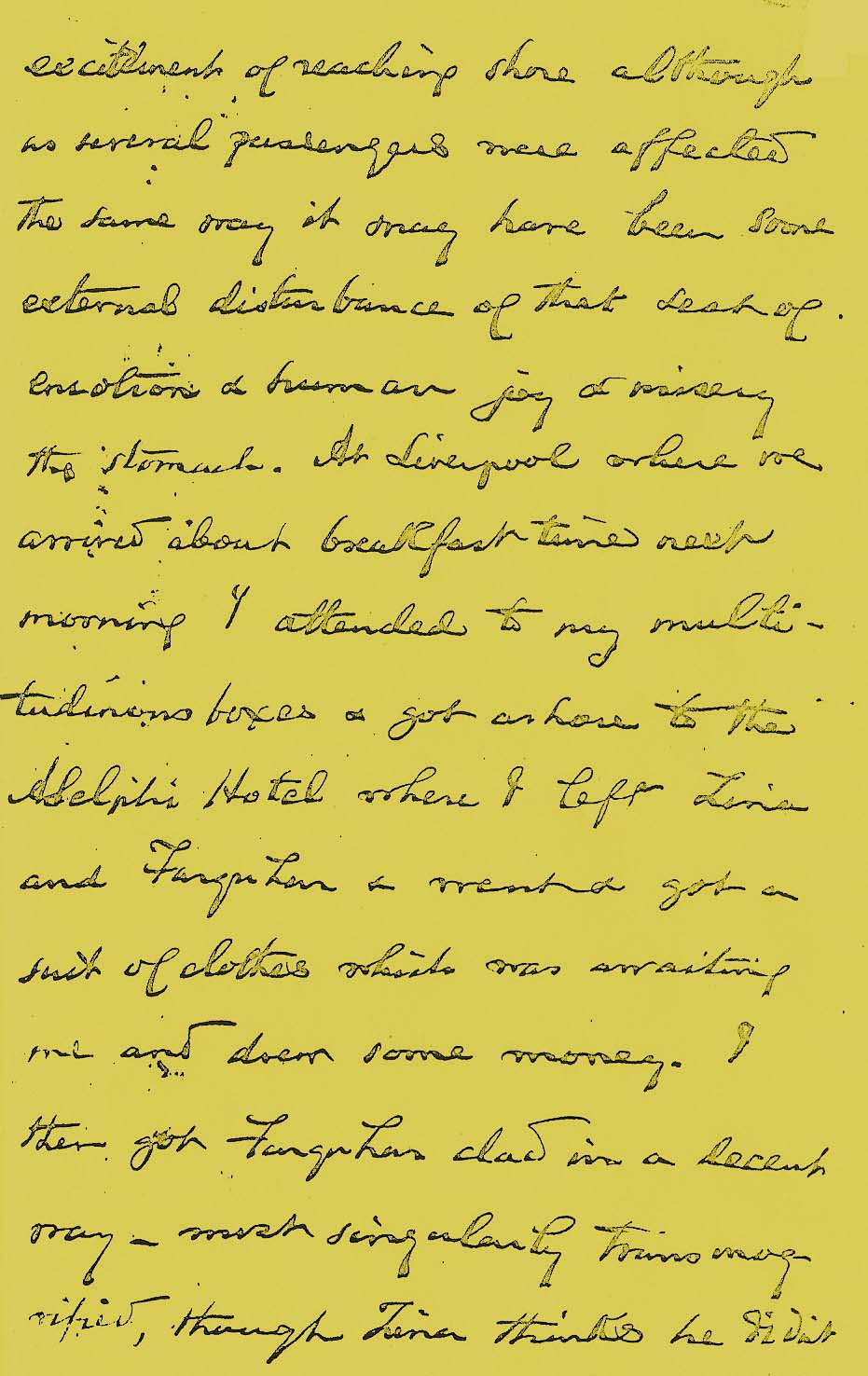
|
excitement of reaching shore although as several passengers were affected the same way it may have been some external disturbance of that seat of emotion & human joy & misery the stomach. At Liverpool where we arrived about breakfast time next morning I attended to my multitudinous boxes & got ashore to the Adelphi Hotel where I left Zina and Farquhar & went & got a suit of clothes which was awaiting me and drew some money. I then got Farquhar clad in a decent way –most singularly transmogrified, though Zina thinks he didn’t
|
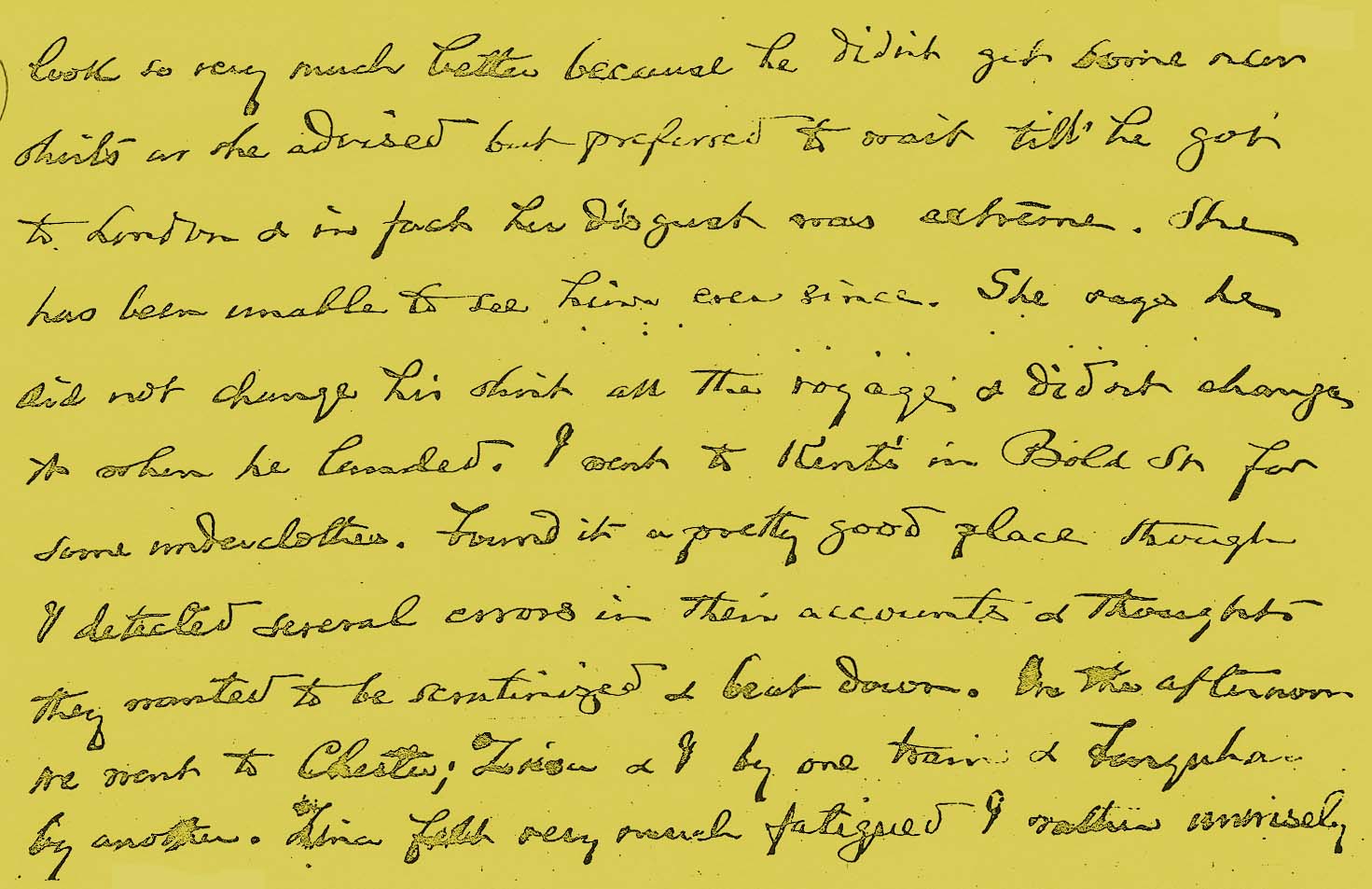
|
look so very much better because he didn’t get some new shirts as she advised but preferred to wait till he got to London & in fact her disgust was extreme. She has been unable to see him ever since. She says he did not change his shirt all the voyage & didn’t change it when he landed. I went to Kent’s in Bold St. for some underclothes. Found it a pretty good place though I detected several errors in their accounts & thought they wanted to be scrutinized & beat down. In the afternoon we went to Chester; Zina & I by one train & Farquhar by another. Zina felt very much fatigued I rather unwisely
|
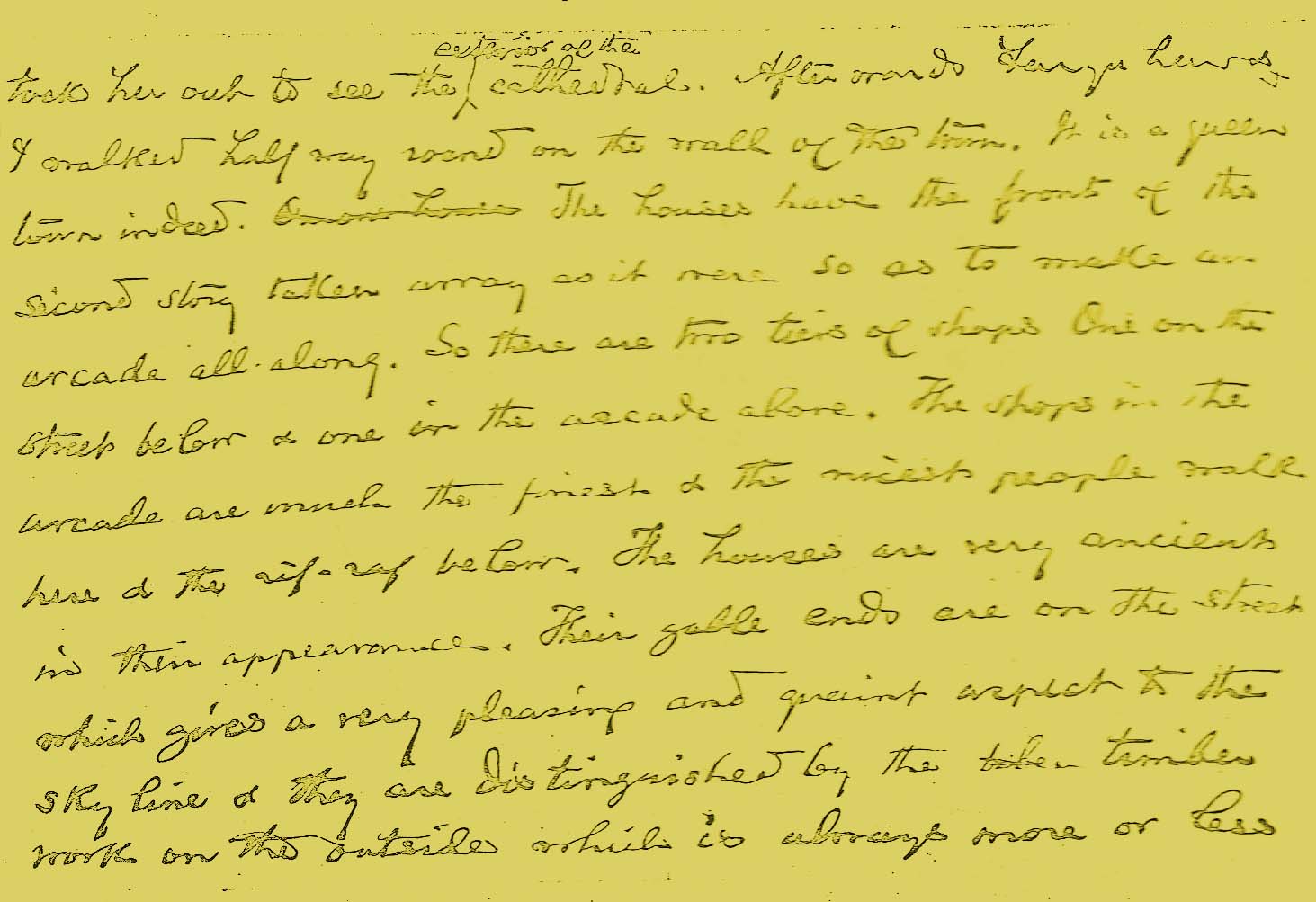
|
took her out to see the exterior of the cathedral. Afterwards Farquhar & I walked half way round on the wall of the town. It is a queer town indeed. The houses have the front of the second story taken away as it were so as to make an arcade all along. So there are two tiers of shops. One on the street below & one in the arcade above. The shops in the arcade are much the finest & the nicest people walks here & the rif-raf below. The houses are very ancient in their appearance. Their gable ends are on the street which gives a very pleasing and quaint aspect to the sky line & they are distinguished by the timber work on the outside which is always more or less
|
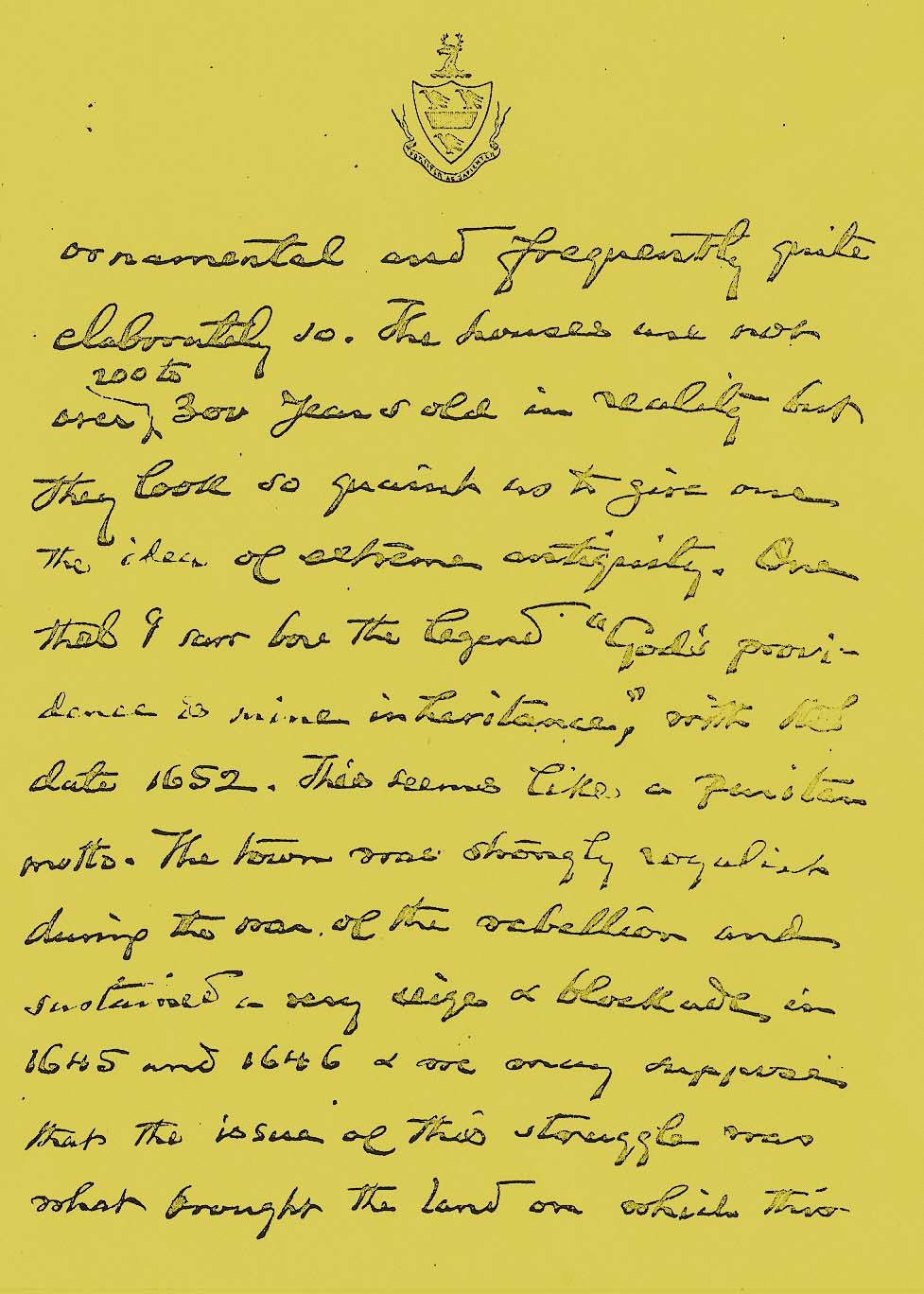
|
ornamental and frequently quite elaborately so. The houses are not over 200 to 300 years old in reality but they look so quaint as to give one the idea of extreme antiquity. One that I saw bore the legend “God’s providence is my inheritance”, with the date 1652. This seems like a puritan motto. The town was strongly royalist during the war of the rebellion and sustained a very siege & blockade in 1645 and 1646 & we may suppose that the issue of this struggle was what brought the land on which this
|
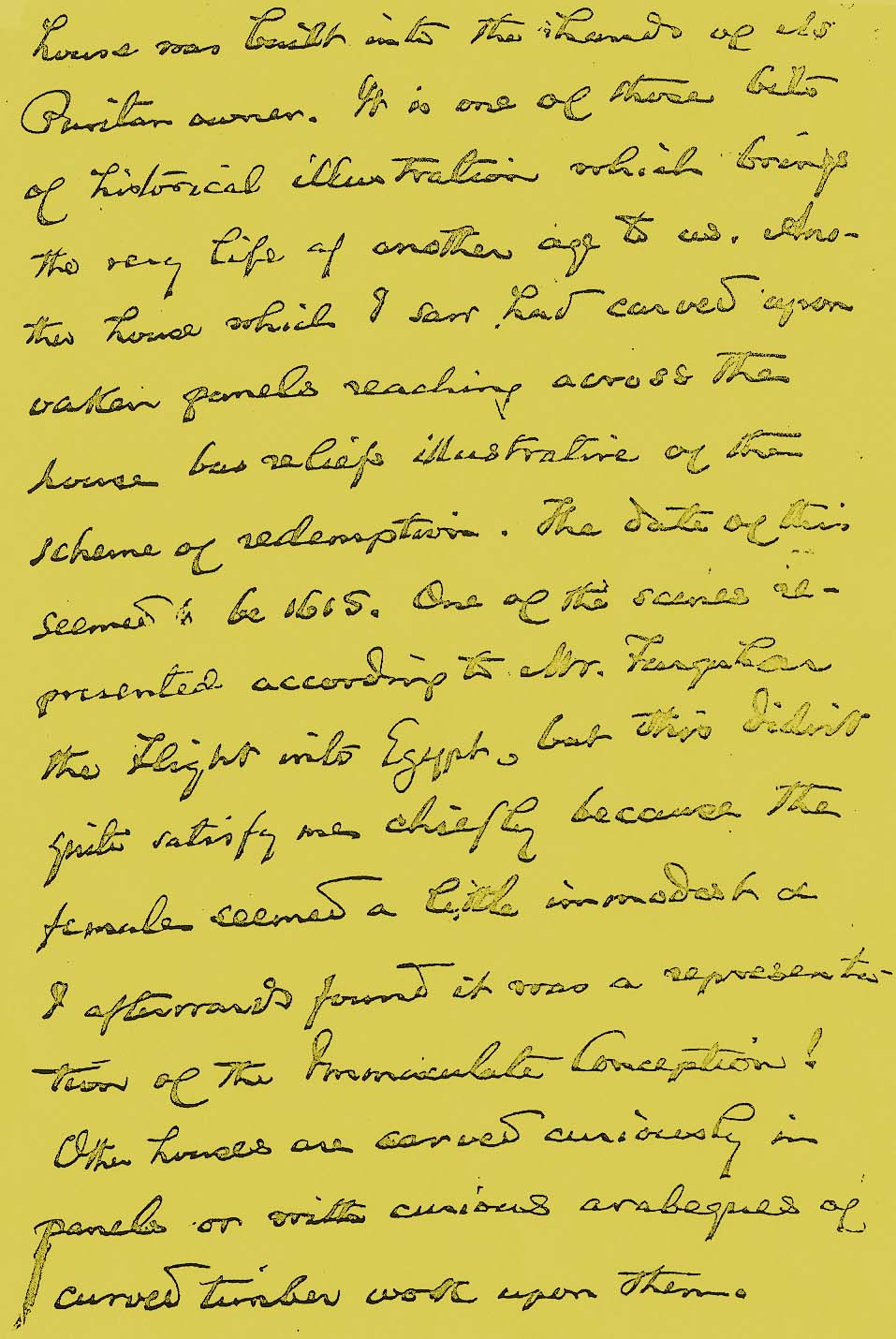
|
house was built into the hands of its Puritan owner. It is one of those bits of historical illustration which brings the very life of another age to us. Another house which I saw had carved upon oaken panels reaching across the house bas reliefs illustrative of the scheme of redemption. The date of this seemed to be 1615. One of the scenes represented according to Mr. Farquhar the Flight into Egypt, but this didn’t quite satisfy me chiefly because the female seemed a little immodest & I afterwards found it was a representation of the Immaculate Conception! Other houses are carved curiously in panels or with curious arabesques of curved timber work upon them.
|
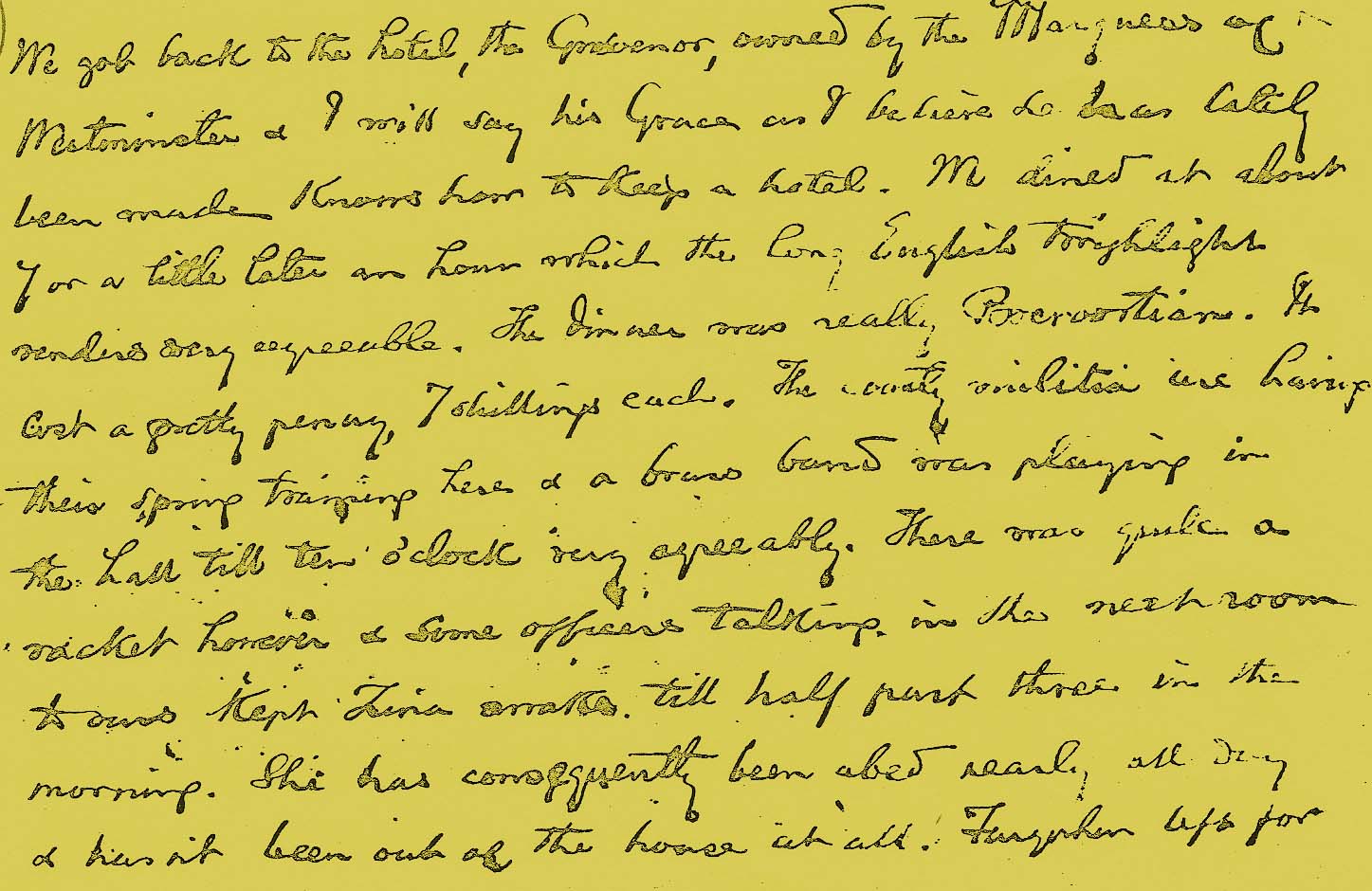
|
We got back to the hotel, the Grosvenor, owned by the Marques of Westminster & I will say his Grace as I believe he has lately been made knows how to keep a hotel. We dined at about 7 or a little later an hour which the long English twilight renders very agreeable. The dinner was really Brevoortian. It cost a pretty penny, 7 shillings each. The County militia are having their spring training here & a brass band was playing in the hall till ten o’clock very agreeably. There was quite a racket however & some officers talking in the next room to ours kept Zina awake till half past three in the morning. She has consequently been abed nearly all day & hasn’t been out of the house at all. Farquhar left for
|
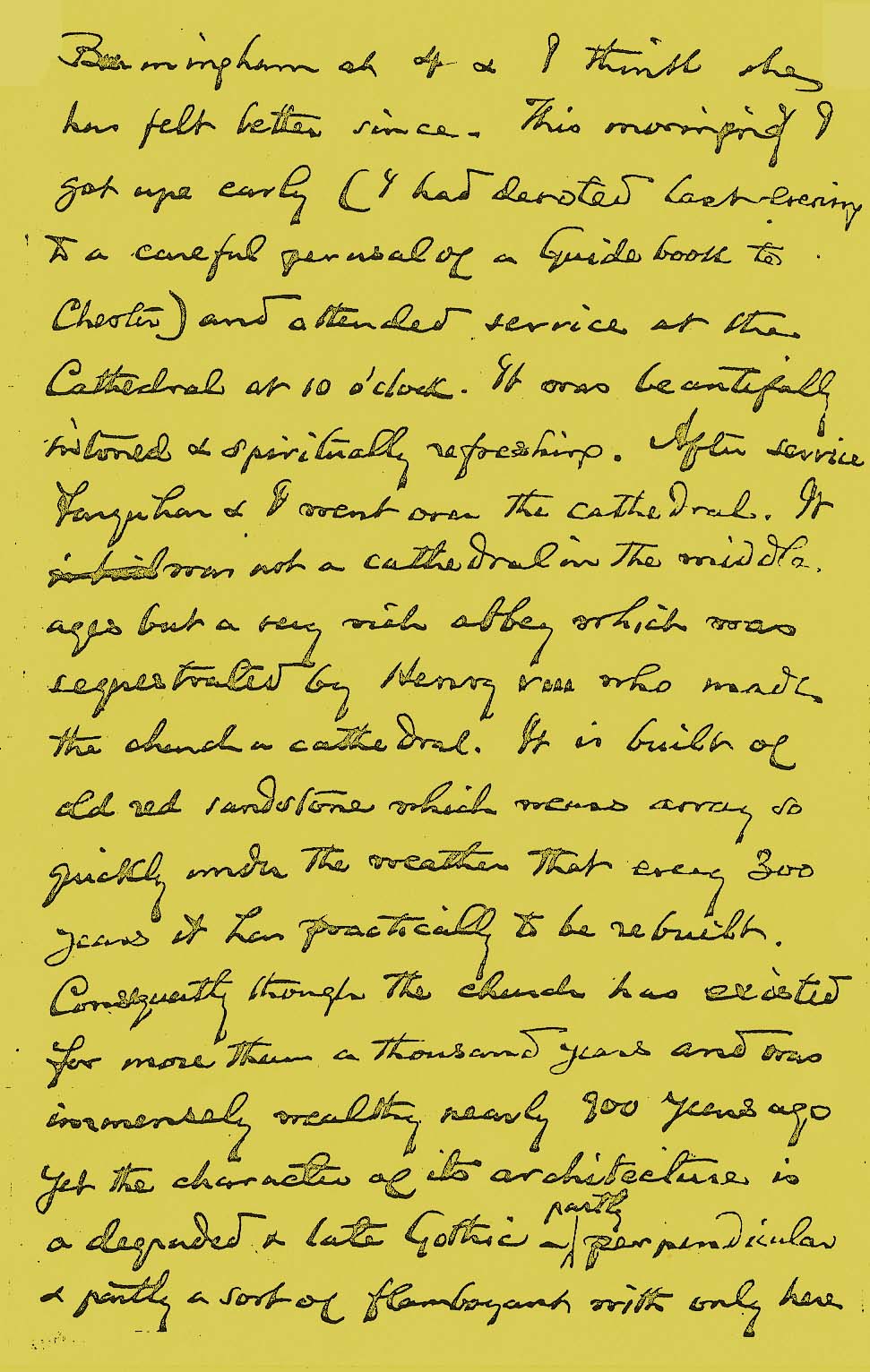
|
Birmingham at 4 & I think she has felt better since. This morning I got up early (I had devoted last evening to a careful perusal of a Guide book to Chester) and attended service at the Cathedral at 10 o’clock. It was beautifully intoned & spiritually refreshing. After service Farquhar and I went over the cathedral. It was not a cathedral in the middle ages but a very rich abbey which was sequestrated by Henry VIII who made the church a cathedral. It is built of old red sandstone which wears away so quickly under the weather that every 300 years it has practically to be rebuilt. Consequently though the church has existed for more than a thousand years and was immensely wealthy nearly 900 years ago yet the character of its architecture is a degraded & late Gothic –partly perpendicular & partly a sort of flamboyant with only here
|
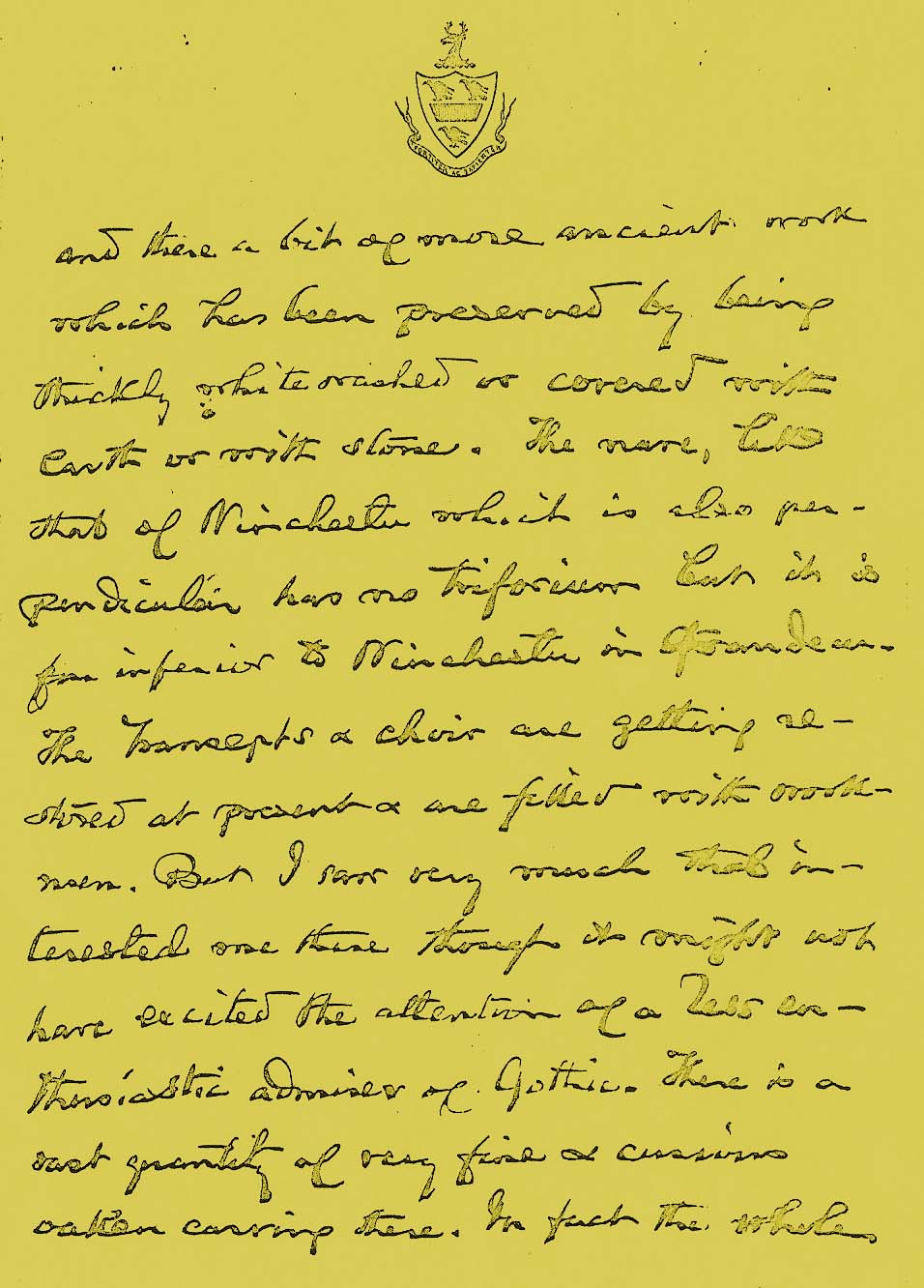
|
and there a bit of more ancient work which has been preserved by being thickly whitewashed or covered with earth or with stone. The nave, like that of Winchester which is also perpendicular has no triforium but it is far inferior to Winchester in grandeur. The transepts & choir are getting restored at present & are filled with workmen. But I saw very much that interested me there though it might not have excited the attention of a less enthusiastic admirer of Gothic. There is a vast quantity of very fine & curious oaken carving there. In fact the whole
|
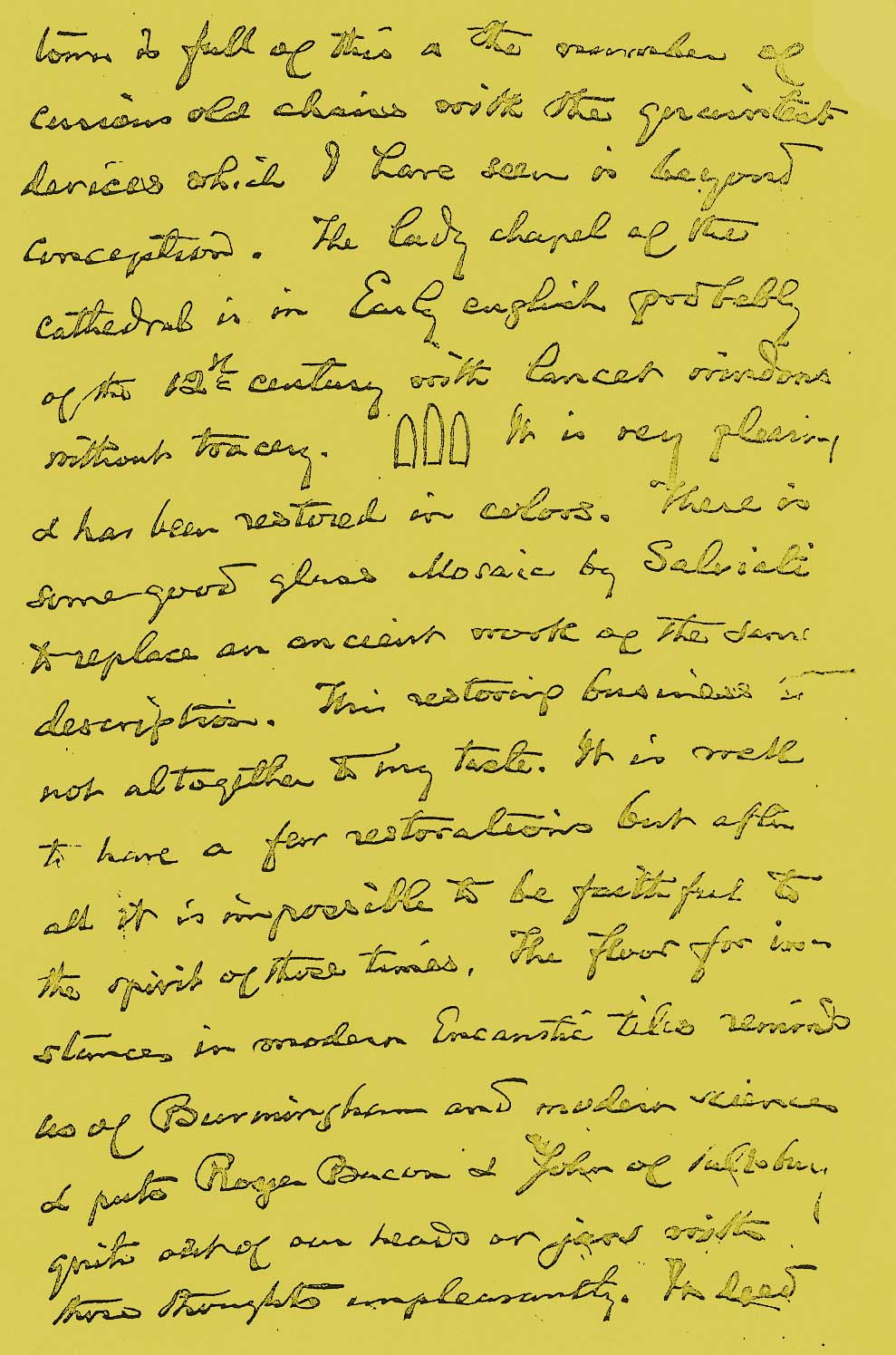
|
town is full of this & the number of curious old chairs with the quaintest devices which I have seen is beyond conception. The lady chapel of the cathedral is in Early English probably of the 12th century with lancet windows without tracery.  It is very pleasing & has been restored in colors. There is some good glass Mosaic by Salviati to replace an ancient work of the same description. This restoring business is not altogether of my taste. It is well to have a few restorations but after all it is impossible to be faithful to the spirit of those times. The floor for instances in modern Encaustic tiles remind us of Birmingham and modern science & puts Roger Bacon & John of Salisbury quite out of our heads or just with those thoughts unpleasantly. Indeed
|
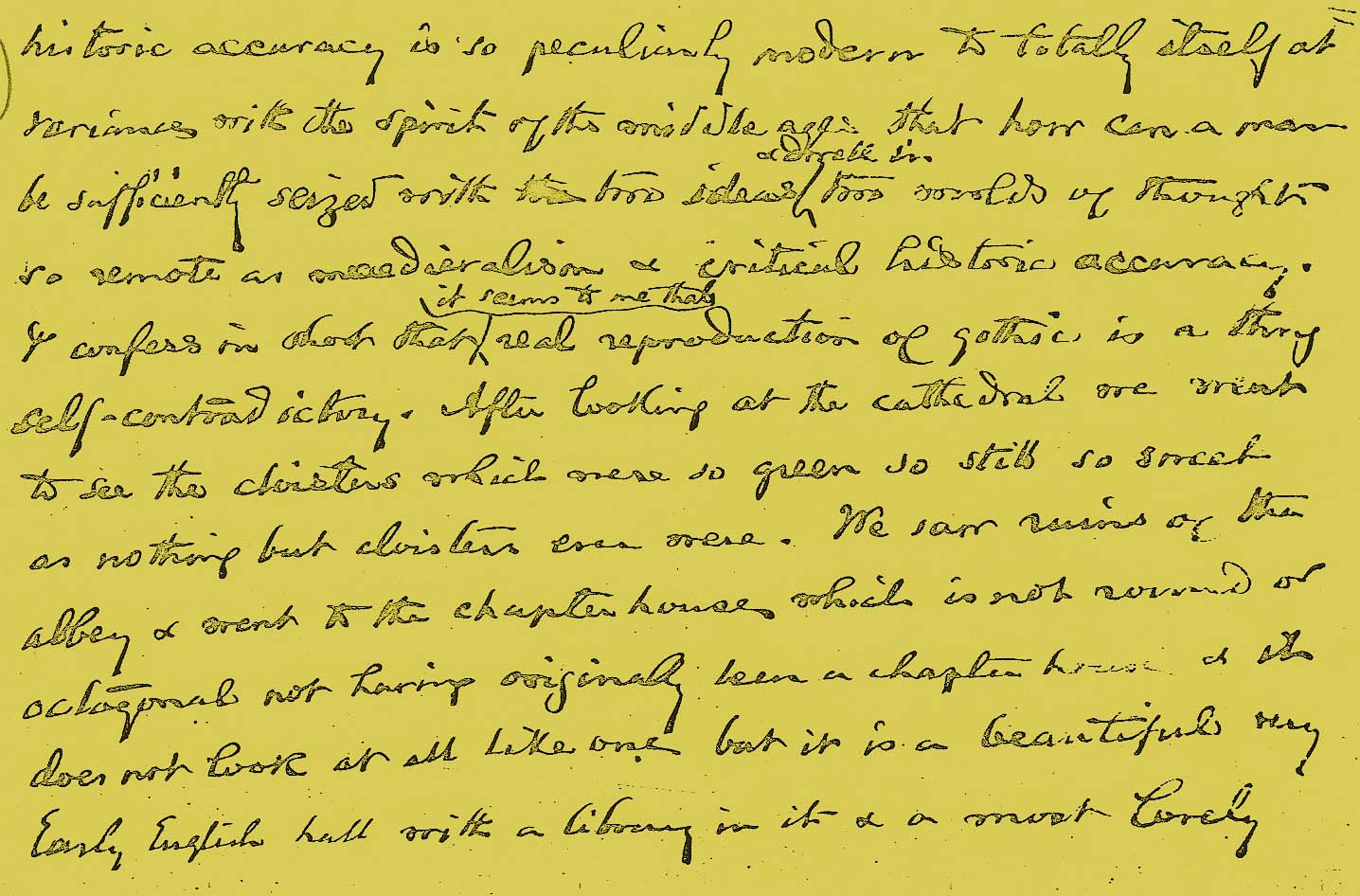
|
historic accuracy is so peculiarly modern to totally itself at variances with the spirit of the middle ages that how can a man be sufficiently seized with two ideas & dwell in two worlds of thought so remote as medievalism & critical historic accuracy. I confess in short that it seems to me that real reproduction of Gothic is a thing self-contradictory. After looking at the cathedral we went to see the cloisters which were so green so still so sweet as nothing but cloisters ever were. We saw ruins of the abbey & went to the chapter house which is not round or octogonal not having originally been a chapter house & it does not look at all like one but it is a beautiful very Early English hall with a library in it & a most lovely
|
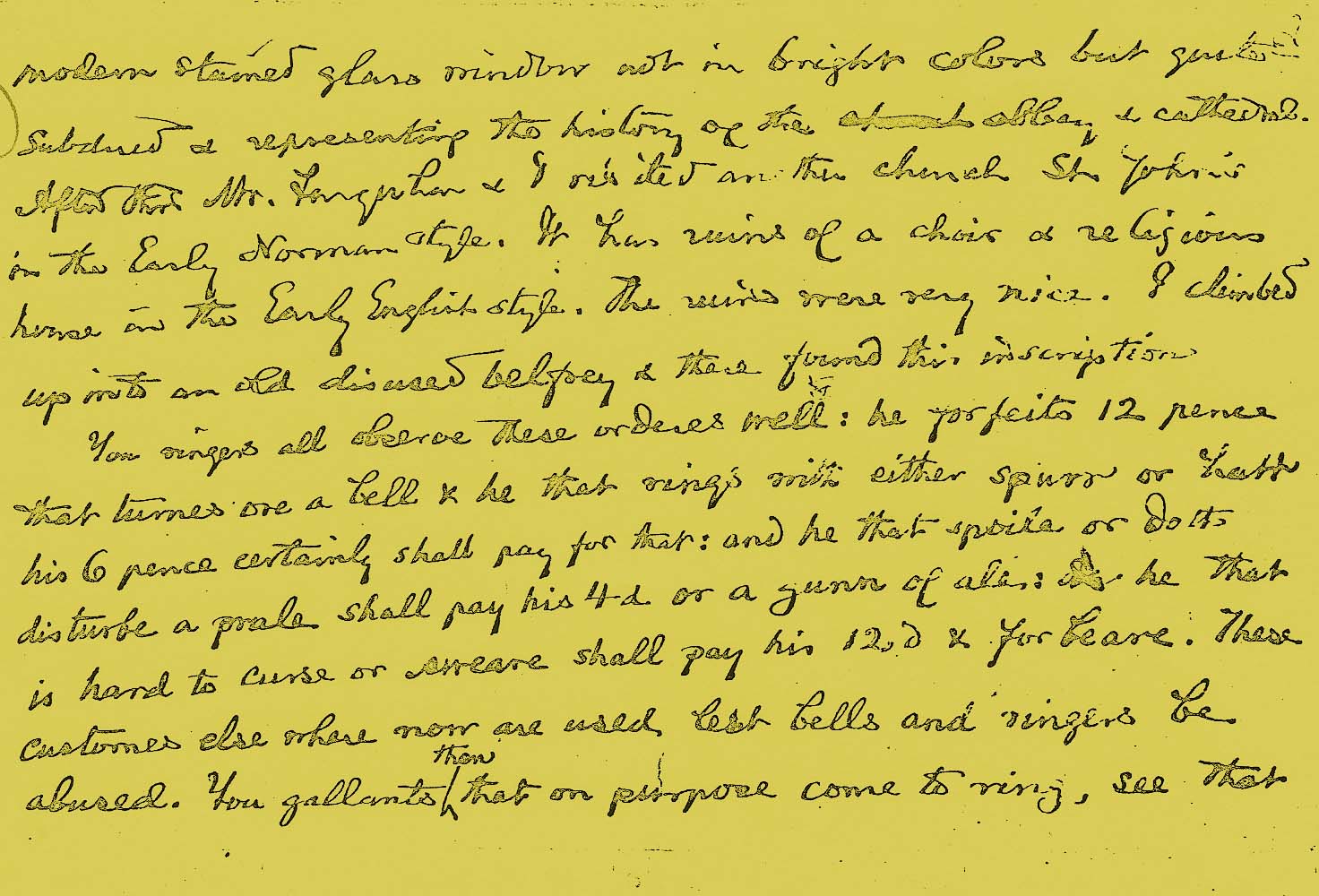
|
modern stained glass window not in bright colors but quite subdued & representing the history of the abbey & cathedral. After that Mr. Farquhar & I visited another church St. John’s in the Early Norman style. It has ruins of a choir & religious house in the Early English style. The ruins were very nice. I climbed up into an old disused belfry & there found this inscription
You ringers all observe these orders well: he forfeits 12 pence that turnes on a bell & he that rings with either spurr or hath his 6 pence certainly shall pay for that: and he that spoils or doth disturbe a prale shall pay his 4 d or a gunn of ale: he that is hard to curse or sweare shall pay his 12 d & forbeare. These customes else where now are used lest bells and ringers be abused. You gallants then that on purpose come to ring, see that |
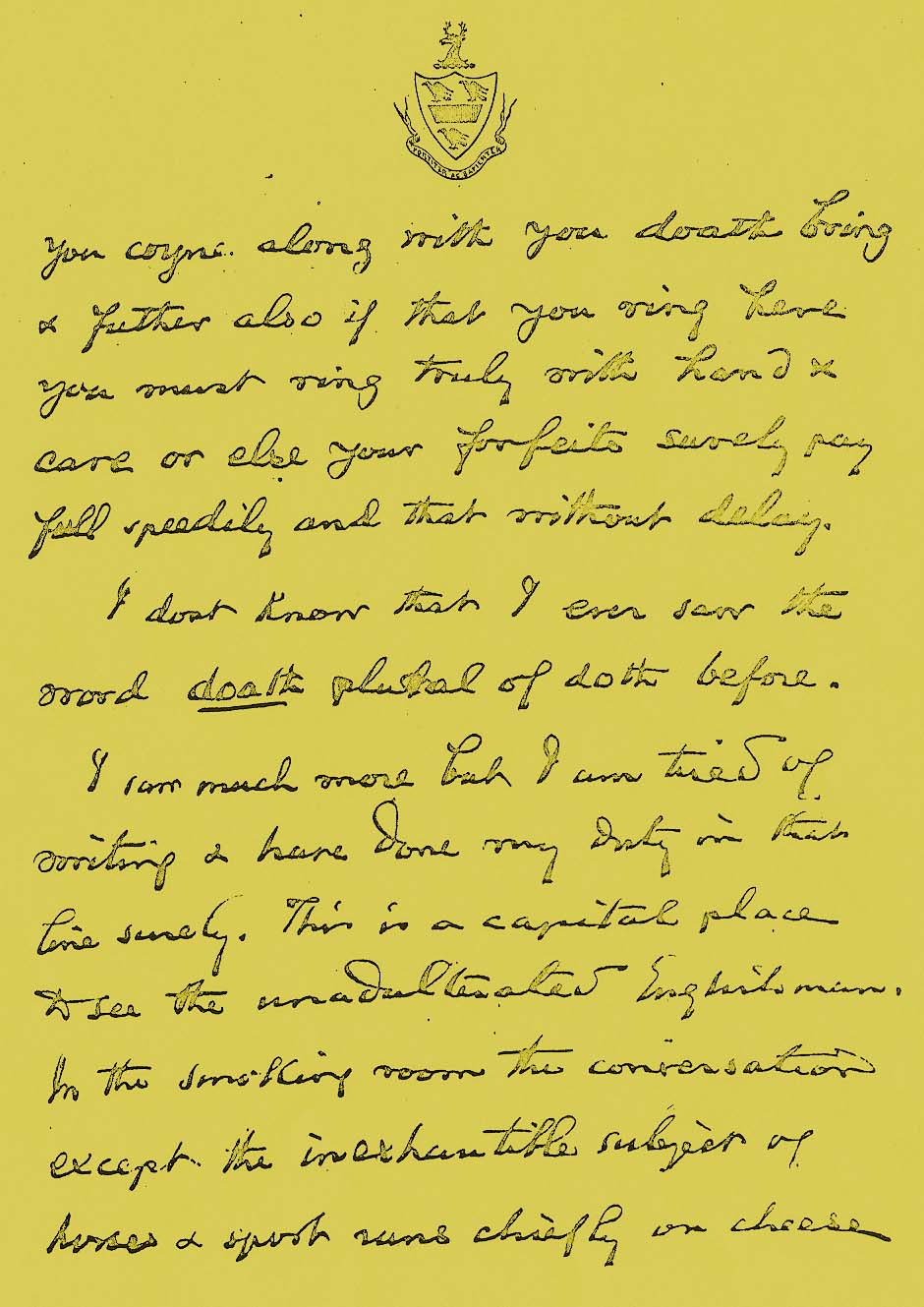
|
you coyns along with you doath bring & further also if that you ring here you must ring truly with hand & care or else your forfeits surely pay full speedily and that without delay.
I don’t know that I ever saw the word doath plural of doth before. I saw much more but I am tired of writing & have done my duty in that line surely. This is a capital place to see the unadulterated Englishman. In the smoking room the conversation except the inexhaustible subject of horses & sport runs chiefly on cheese
|
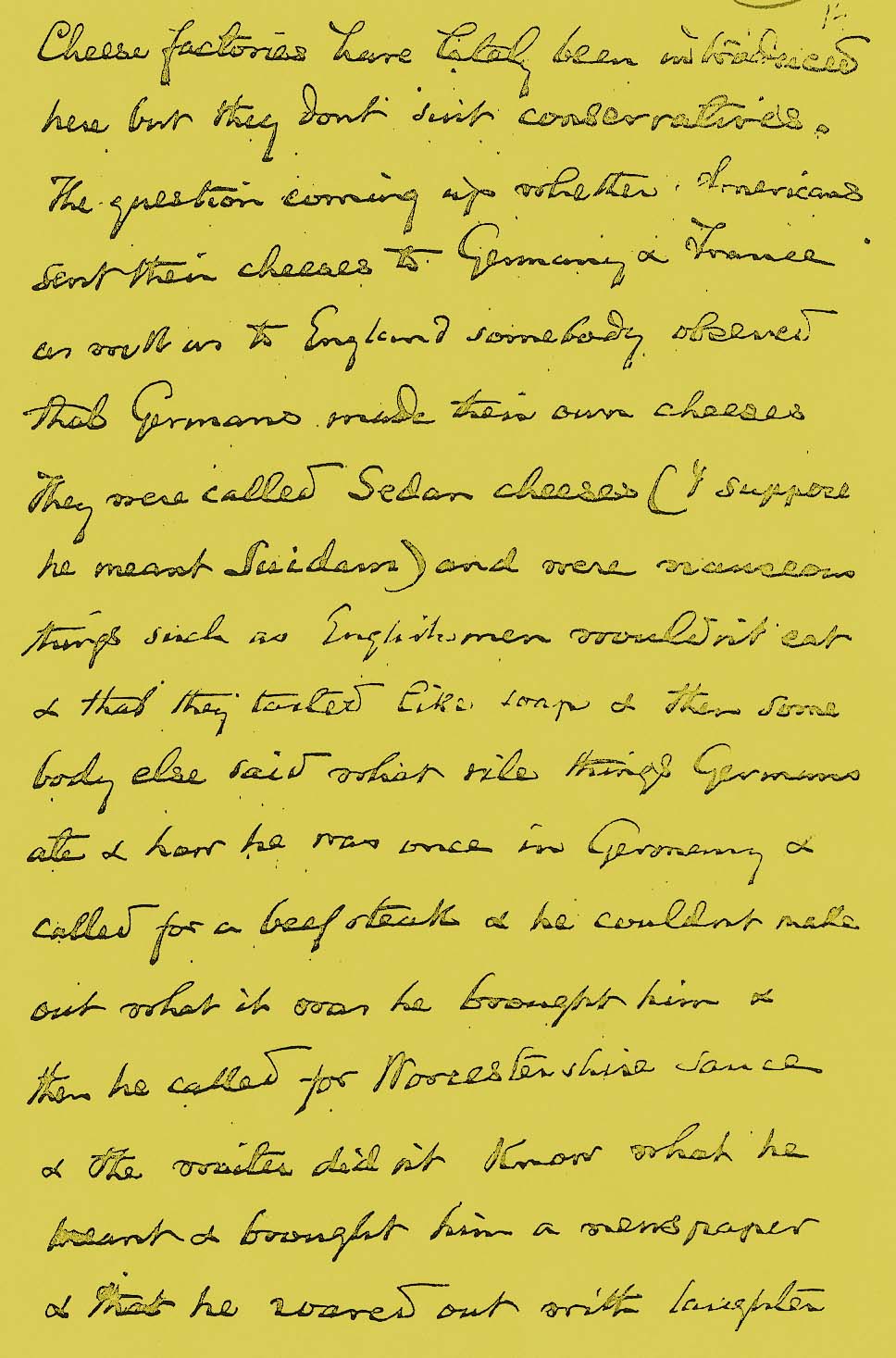
|
Cheese factories have lately been introduced here but they don’t suit conservatives. The question coming up whether Americans send their cheeses to Germany & France as well as to England somebody observed that Germans made their own cheeses They were called Sedan cheeses (I suppose he meant Suidam) and were nauseous things such as Englishmen wouldn’t eat & that they tasted like soap & then somebody else said what vile things Germans ate & how he was once in Germany & called for a beef steak & he couldn’t make out what it was he brought him & then he called for Worcestershire sauce & the waiter didn’t know what he meant & brought him a newspaper & that he roared out with laughter
|
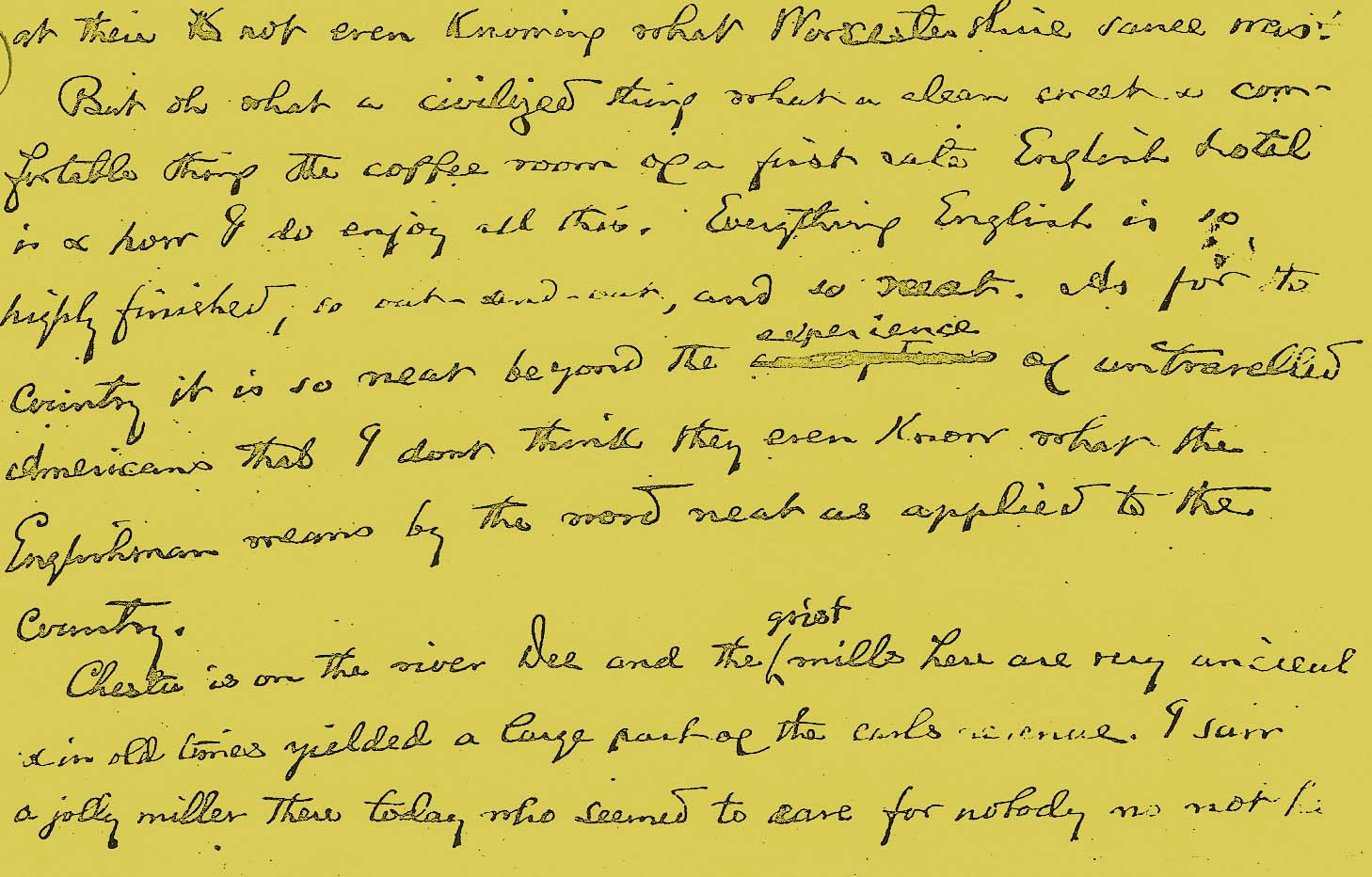
|
at their not even knowing what Worcestershire sauce was!
But oh what a civilized thing what a clean sweet & comfortable thing the coffee room of a first rate English hotel is & how I do enjoy all this. Everything English is so highly finished, so out-and-out, and is neat. As for the country it is so neat beyond the experience of untraveled Americans that I don’t think they even know what the Englishman means by the word neat as applied to the country. Chester is on the river Dee and the grist mills here are very ancient & in old times yielded a large part of the earls revenue. I saw a jolly miller there today who seemed to care for nobody no not he
|
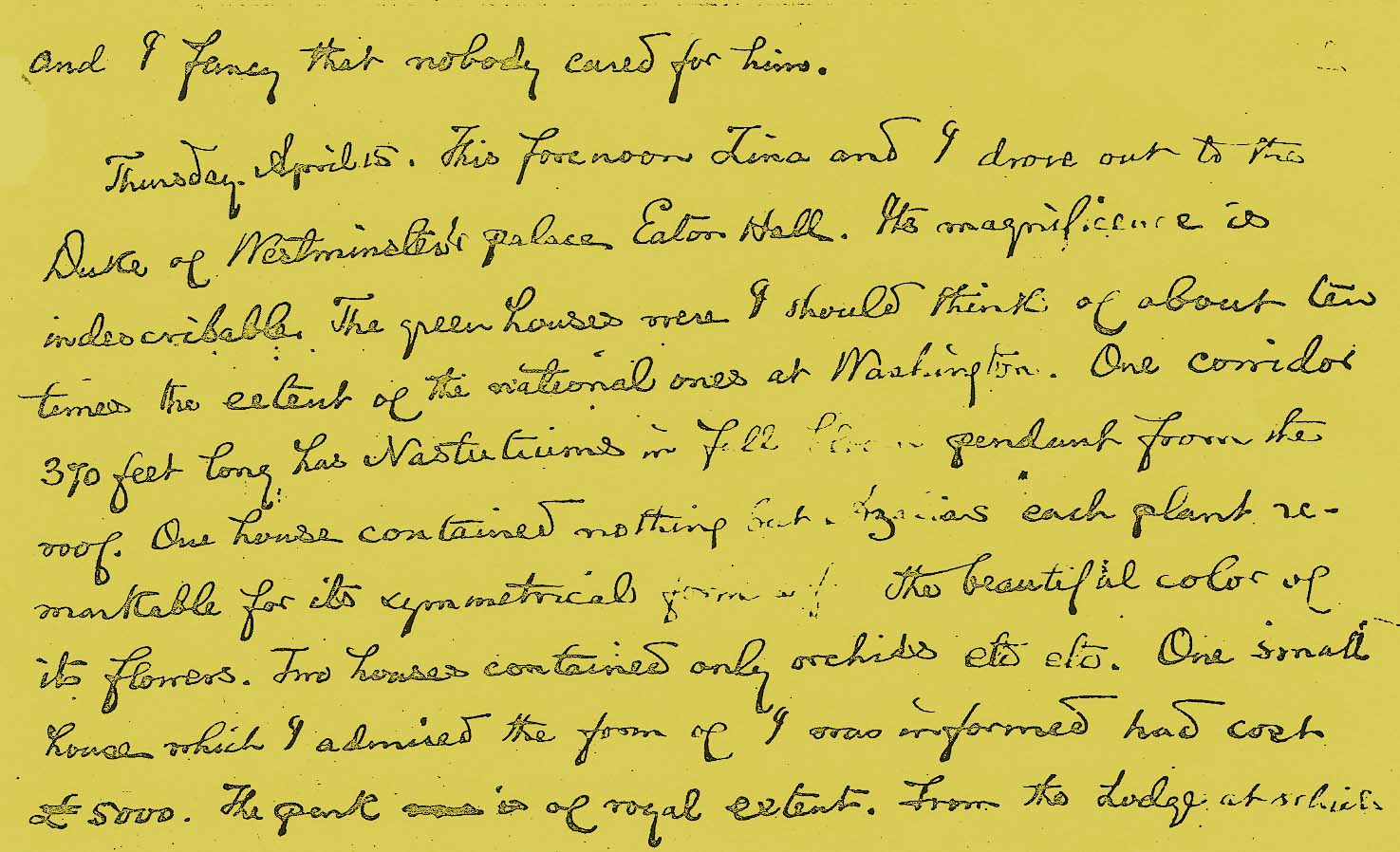
|
and I fancy that nobody cared for him.
Thursday. April 15. This forenoon Zina and I drove out to the Duke of Westminster's palace Eaton Hall. Its magnificence is indescribable. The green houses were I should think of about ten times the extent of the national ones at Washington. One corridor 370 feet has nasturtiums in full bloom pendant from the roof. One house contained nothing but Azaleas each plant remarkable for its symmetrical & for the beautiful color of its flowers. Two houses contained only orchids etc. etc. One small house which I admired the form of I was informed had cost 5000. The park is of royal extent. From the Lodge at which
|
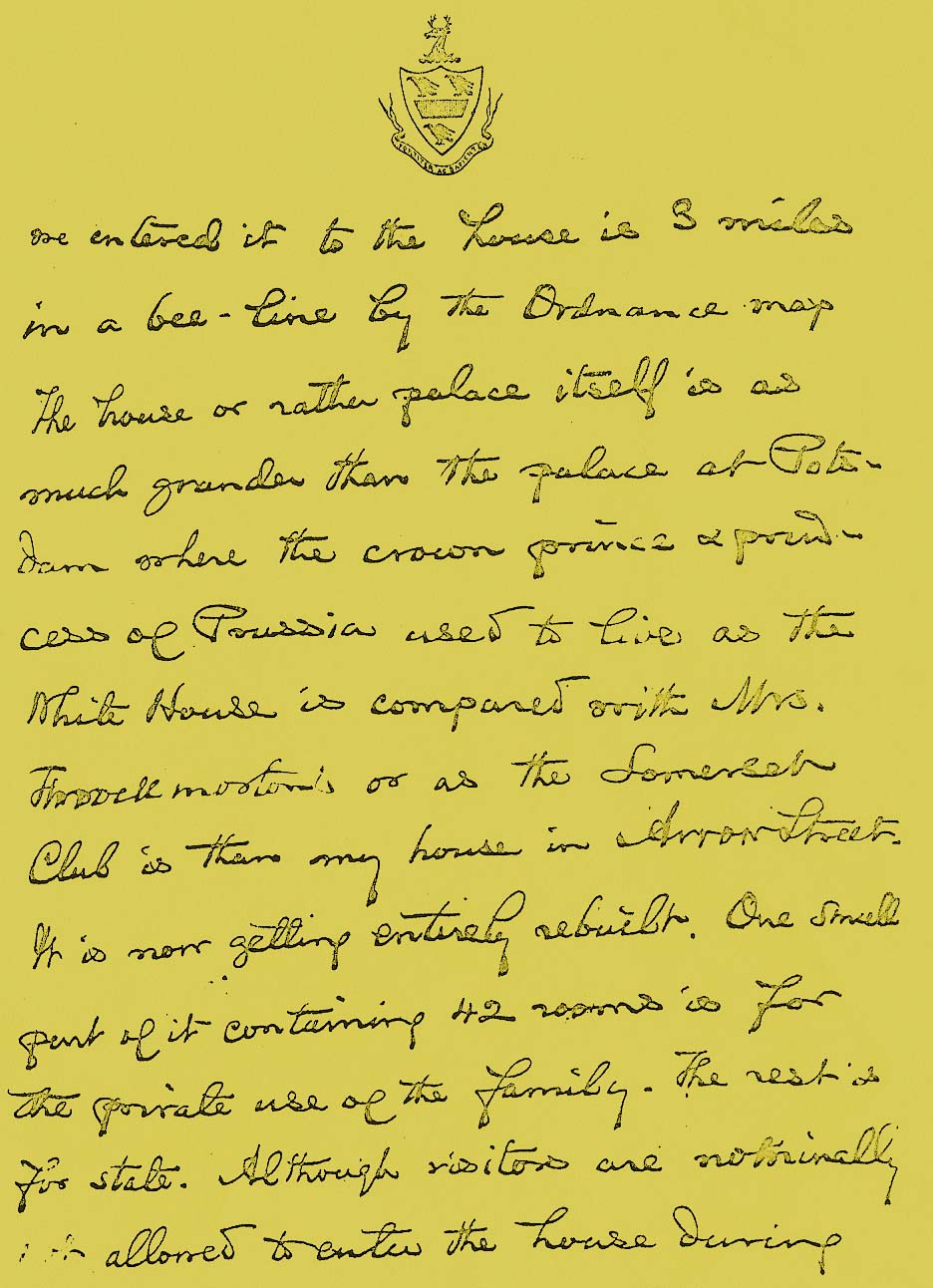
|
we entered it to the house is 3 miles in a bee-line by the Ordnance maps The house or rather palace itself is as much grander than the palace at Potsdam where the crown prince & princess of Prussia used to live as the White House is compared with Mrs. Throckmorton’s or as the Somerset Club is than my house in Arrow Street. It is now getting entirely rebuilt. One small part of it containing 42 rooms is for the private use of the family. The rest is for state. Although visitors are nominally not allowed to enter the house during
|
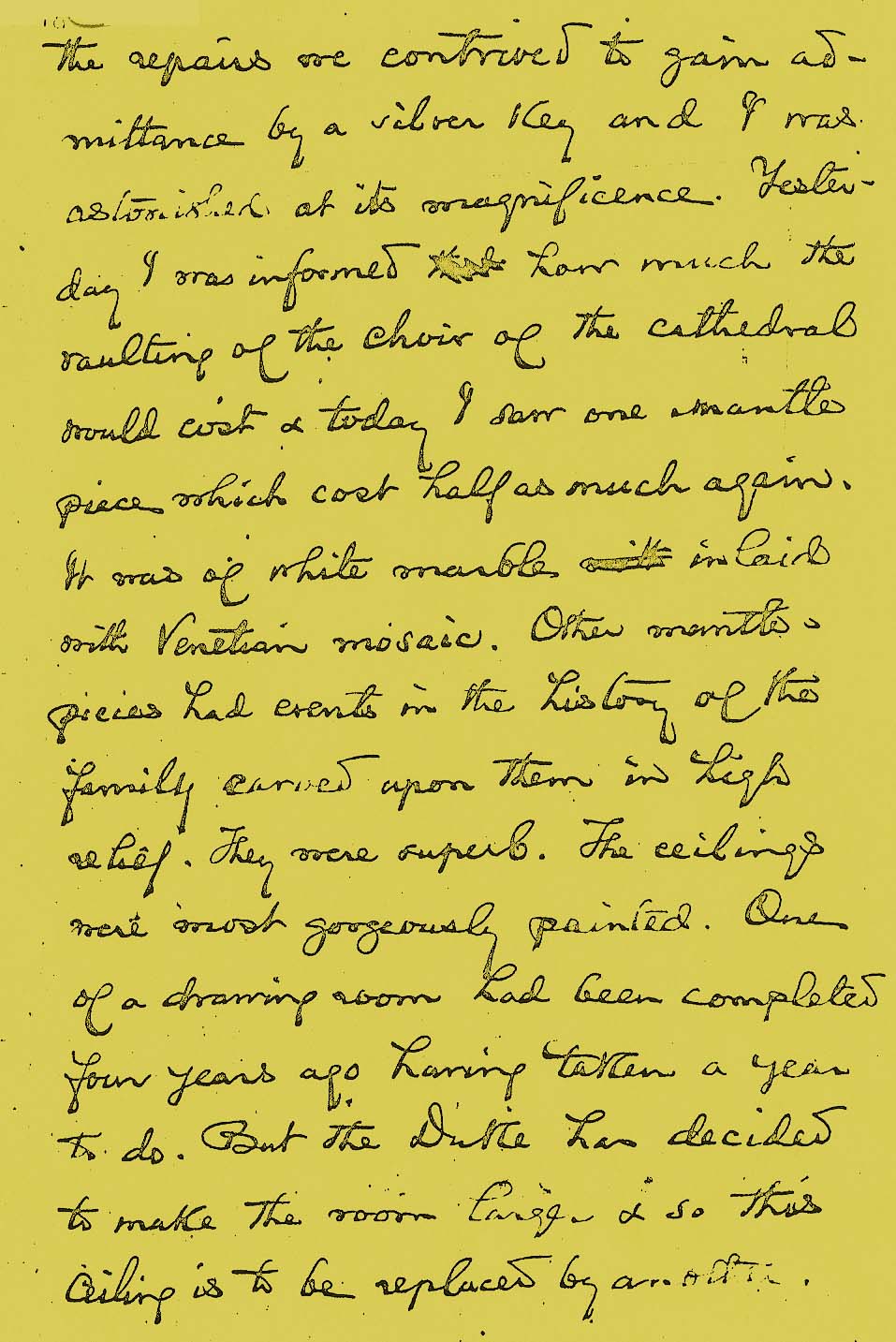
|
the repairs we contrived to gain admittance by a silver key and I was astonished at its magnificence. Yesterday I was informed how much the vaulting of the choir of the cathedral would cost & today I saw one mantle piece which cost half as much again. It was of white marble inlaid with Venetian mosaic. Other mantle pieces had events in the history of the family carved upon them in high relief. They were superb. The ceilings were most gorgeously painted. One of a drawing room had been completed four years ago having taken a year to do. But the Duke has decided to make the room larger & so this ceiling is to be replaced by another.
|
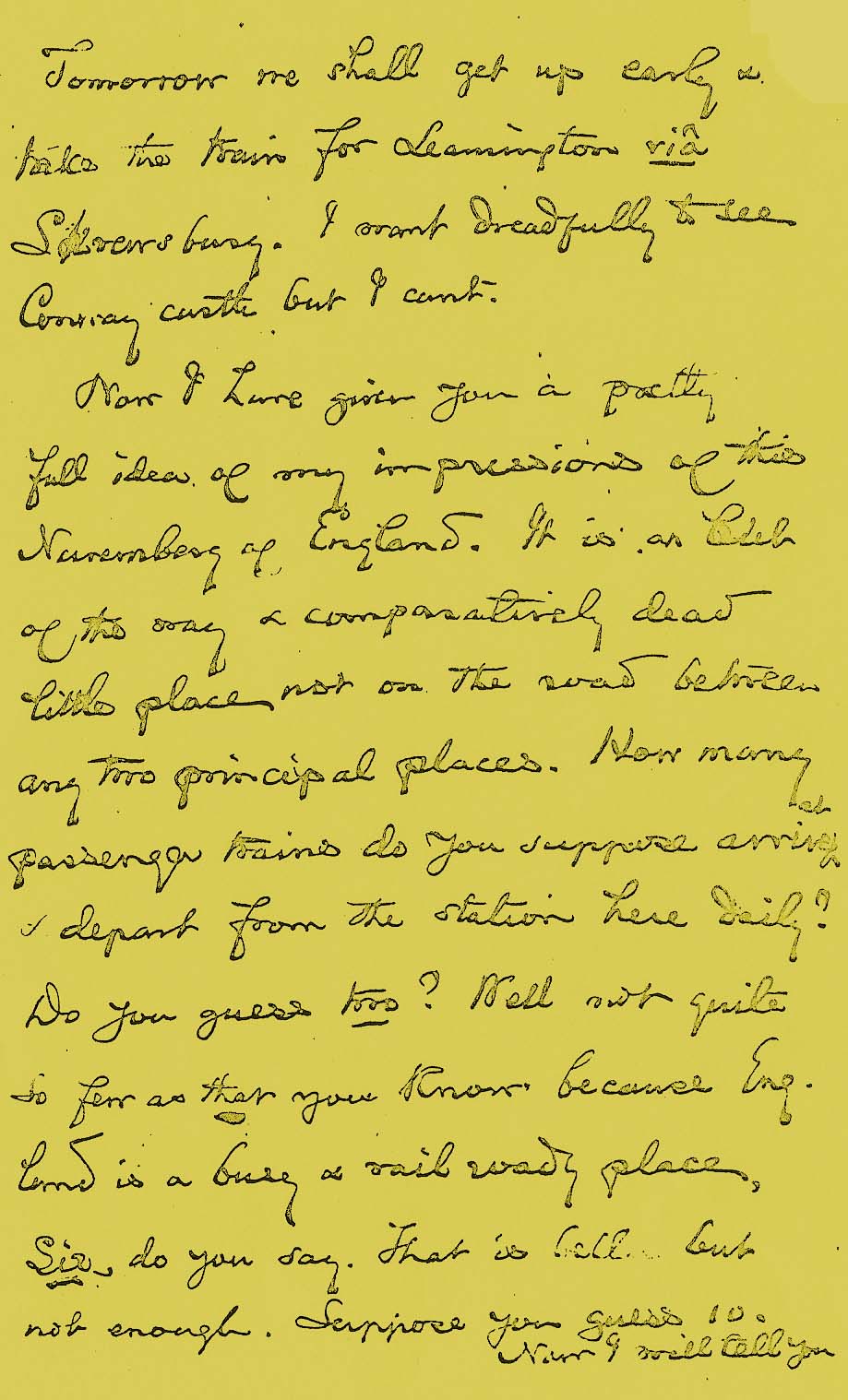
|
Tomorrow we shall get up early & take the train for Leamington via Shrewsbury. I want dreadfully to see Conway castle but I can’t. Now I have given you a pretty full idea of my impressions of this Nuremberg of England. It is an out of the way & comparatively dead little place not on the road between any two principal places. How many passenger trains do you suppose arrive & depart from the station here daily? Do you guess two? Well not quite so few as that you know because England is a busy & railroady place. Six, do you say. That is better but not enough. Suppose you guess 10. Now I will tell you
|
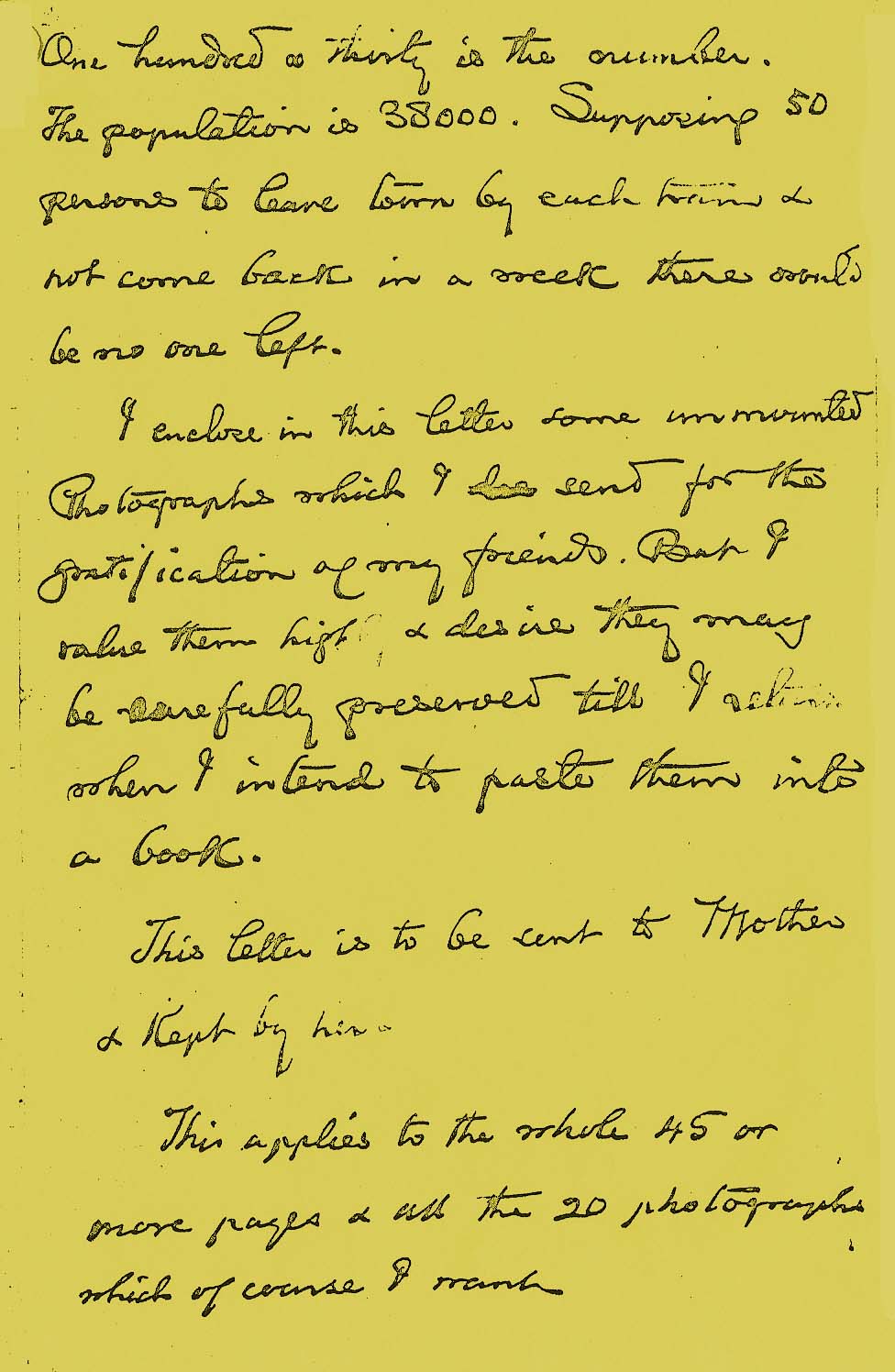
|
One hundred & thirty is the number. The population is 38.000. Supposing 50 persons to leave town by each train & not come back in a week there would be no one left.
I enclose in this letter some unmounted Photographs which I send for the gratification of my friends. But I value them highly & desire they may be carefully preserved till I return when I intend to paste them into a book. This letter is to be sent to Mother & kept by her. This applies to the whole 45 or more pages & all the 20 photographs which of course I want.
|
